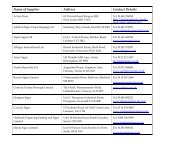titlepage/contents pg 1-16 - British Parking Association
titlepage/contents pg 1-16 - British Parking Association
titlepage/contents pg 1-16 - British Parking Association
You also want an ePaper? Increase the reach of your titles
YUMPU automatically turns print PDFs into web optimized ePapers that Google loves.
<strong>16</strong>4 Chapter 10sector, local authorities shouldtake account of the basic do’sand don’ts shown in Table 10.2.On-street managementLocal authorities may also wishto involve the private sector inparking provision andenforcement on-street. Becausethe outcomes of on-street controlschemes may be difficult topredict in advance, the localauthority will usually need to beresponsible for schemeimplementation, but thesubsequent maintenance,operation and enforcementfunctions may be suitable forprivate sector involvement.Again, the local authority mustExamples of parking account information in south east EnglandAuthority A (A medium size town in south east England)A total of 3150 spaces were provided, 2500 of which were in multi-storey car parks.The in-house service was run at a net cost in 2000/01 of £83,000, or subsidy perspace of £26.Authority B (A rural district with five small towns)The council provides 34 car parks across five towns, a total of 2,334 spaces. Itdoes not charge for car parking, though there are time restrictions in some carparks. The estimated cost for 2000/2001 was £283,850, including around £9,400on enforcement of parking notices and £37,600 on cleaning and maintenance. Thecost or subsidy per space was £121.Authority C (A rural district in south east England)The council provided 20 car parks (of which 5 are free) with costs of £552,625 for1999/2000 and income of £668,991. The total number of parking spaces providedis 2,099. The cost of provision per space was £26. The surplus revenue generatedper space was £55.Authority D (A borough council in south east England)The council’s in-house team of 7.8 staff manages 32 town centre car parks withover 2,700 car parking spaces. In 2001/02 the parking service generated a netincome of £120,000, or £44 per space.Authority E (A borough council in south east England)The council provides 2,700 parking spaces in 43 public off-street car parks free ofcharge. The cost of the service was £214,260 in 1999/2000 (2.4 per cent of thecouncil’s net revenue budget). The Council had a long-term policy of providing freeparking and provided sufficient spaces to meet demand. The subsidy per spacewas £79.Authority F (District Council in south east England)The council provided 2828 car parking spaces in one medium size and three smalltowns. The total expenditure per space in 2001/2002 was £584, while income was£564, producing a revenue loss of £20 per space. However, the account includestwo notional items, which if excluded would mean a monetary surplus of £128 perspace (see table below).Authority F <strong>Parking</strong> Account Summary 2001/2Expenditure General management and overhead costs £685,000Asset rental (notional) £526,000Operational expenditure £443,000Total expenditure £1,654,000Income Staff permits (notional) £104,000Season tickets £149,000Excess charges £75,000Ticket sales £1,239,000Other £29,000Total income £1,596,000retain control over charges andtariff structures.Private sector involvement canintroduce new capital but thishas to be financed. Dependingon the local employmentsituation, revenue costs may bereduced by lower wage costs.Private sector managers mayproduce other advantages suchas easier recruitment with lessbureaucracy, but this should notbe achieved at the expense ofstaff quality and training. Localauthority contracts shouldensure good standards ofservice, and will need to allow forthe cost of monitoring andenforcing these standards withinthe parking account.Private companies nowundertake a substantialproportion of on-streetenforcement, but they havemade less impression on the“back office” systems where localauthorities retain more control.While routine office work couldbe contracted to the privatesector, it is generally desirable toretain within the local authoritythe interface with customers andthe handling of complaints andappeals.If private sector companies areinvolved in on-street operations,there are also opportunities forthem to take over themanagement of the systemscompletely including theprovision and maintenance ofon-street pay-and-display, andcash collection. This may providea stronger incentive to maintainthe equipment, as brokenequipment cannot generate anincome. The issue of which partsof the parking service can orshould be contracted to theprivate sector, and equallyimportant, which should beretained under local authoritycontrol, can be explored throughthe Best Value review process.The <strong>Parking</strong> AccountWithin the Business Plan, therewill need to be a statement ofaccounts. This should usuallyinclude a statement for theprevious financial year, together







